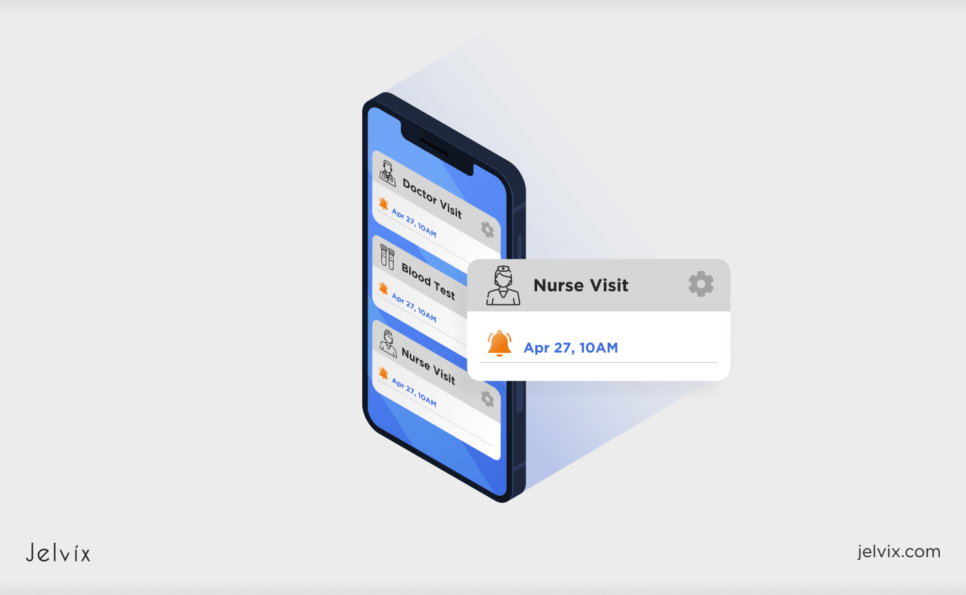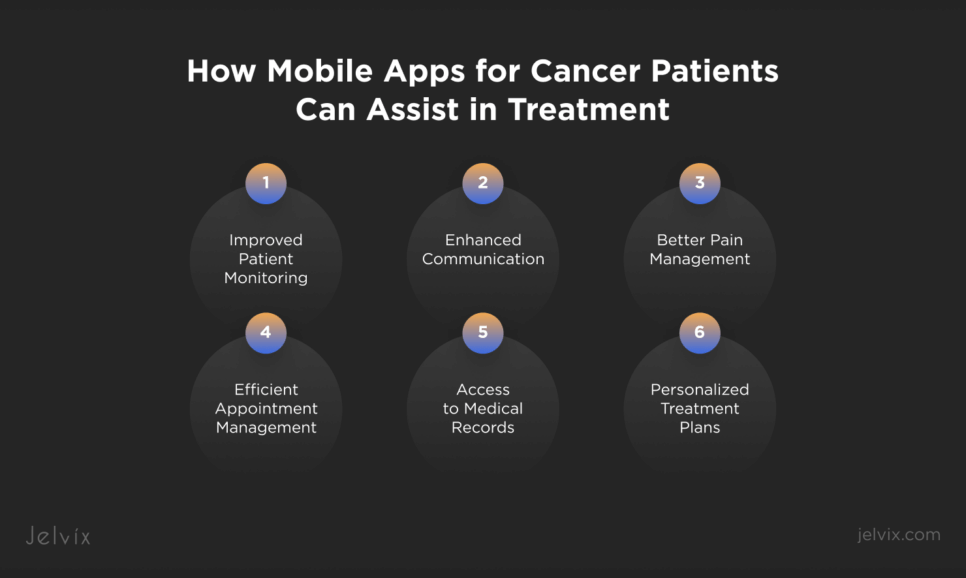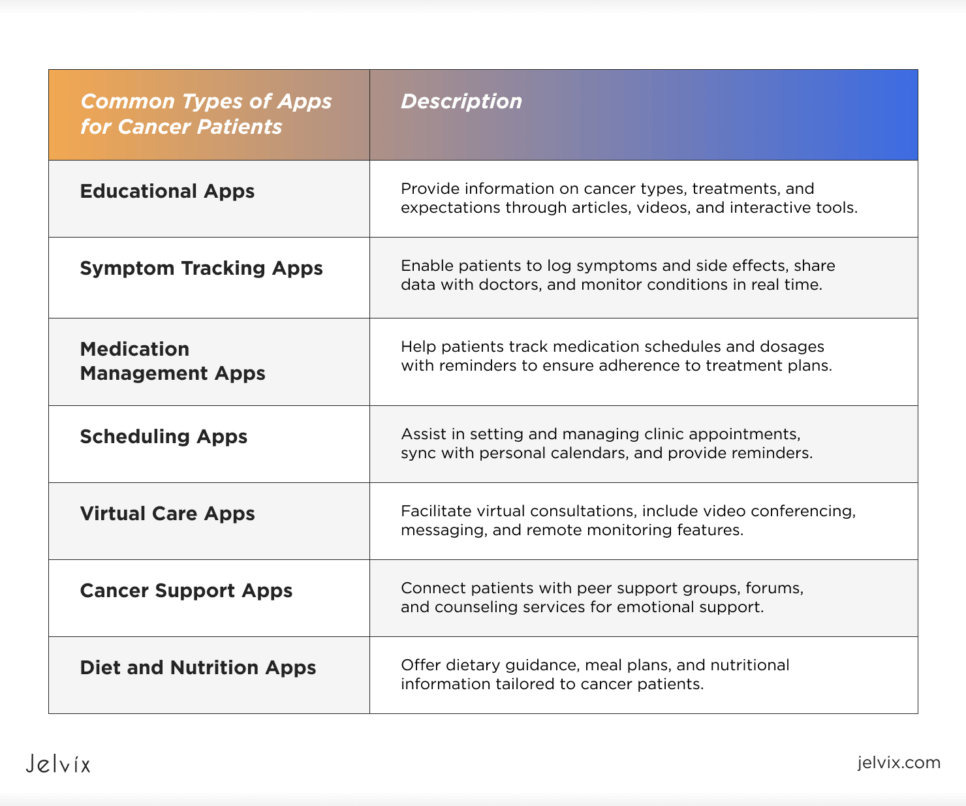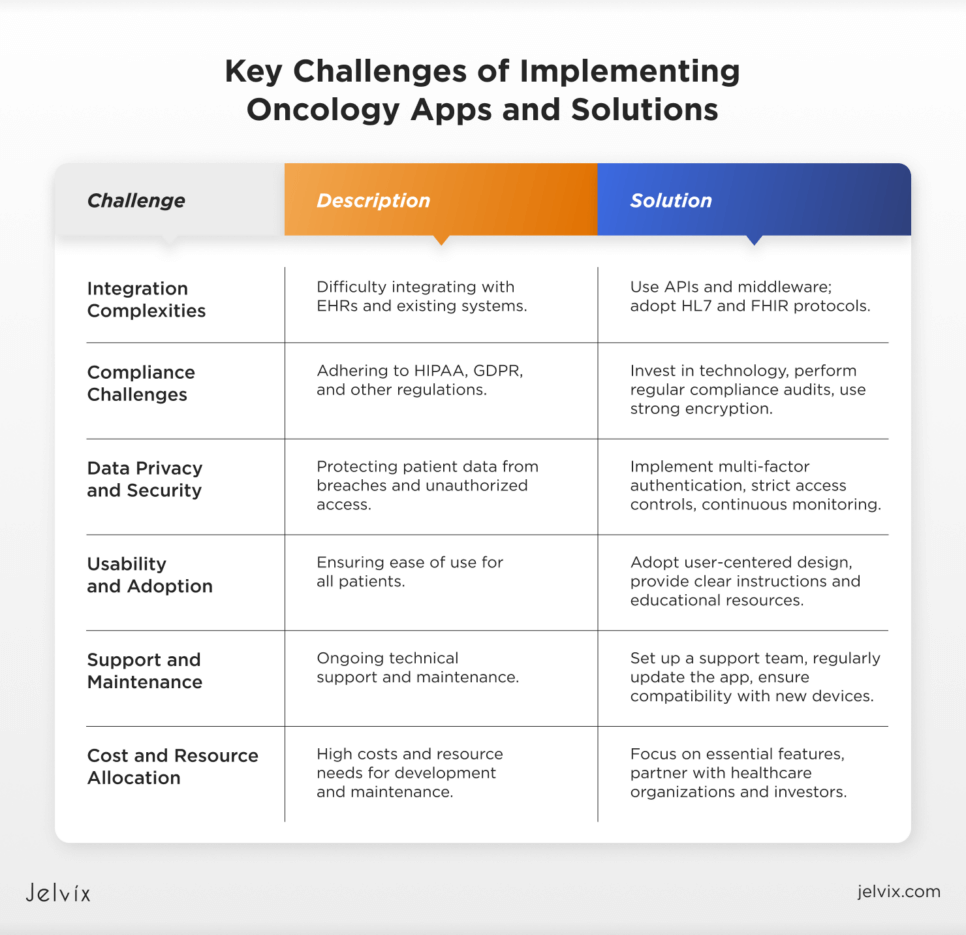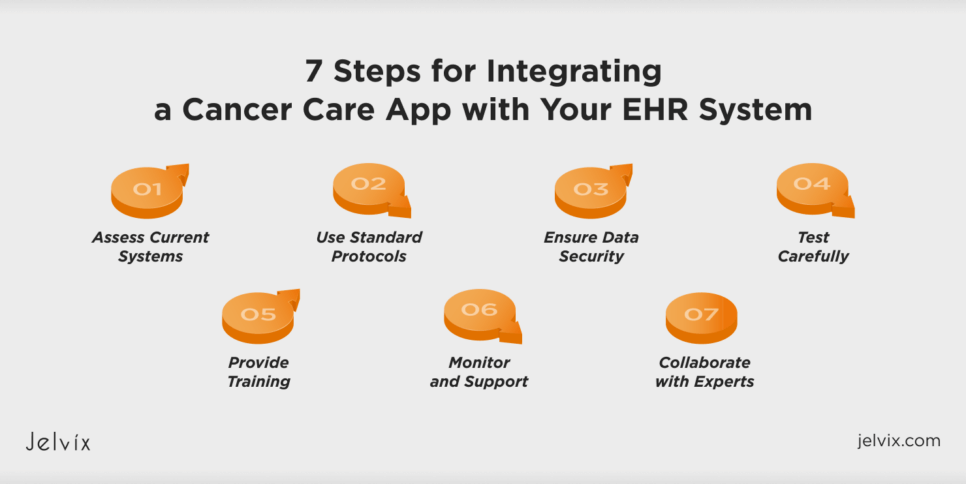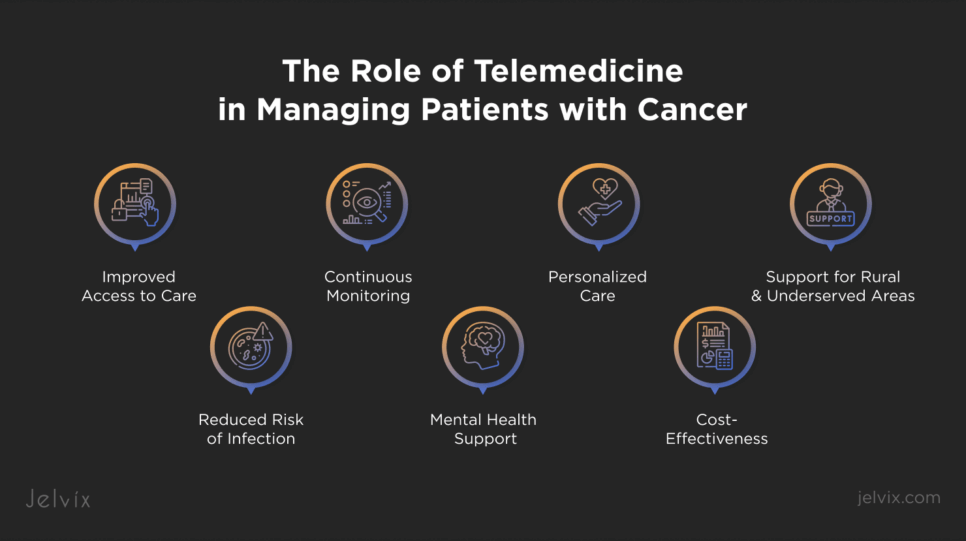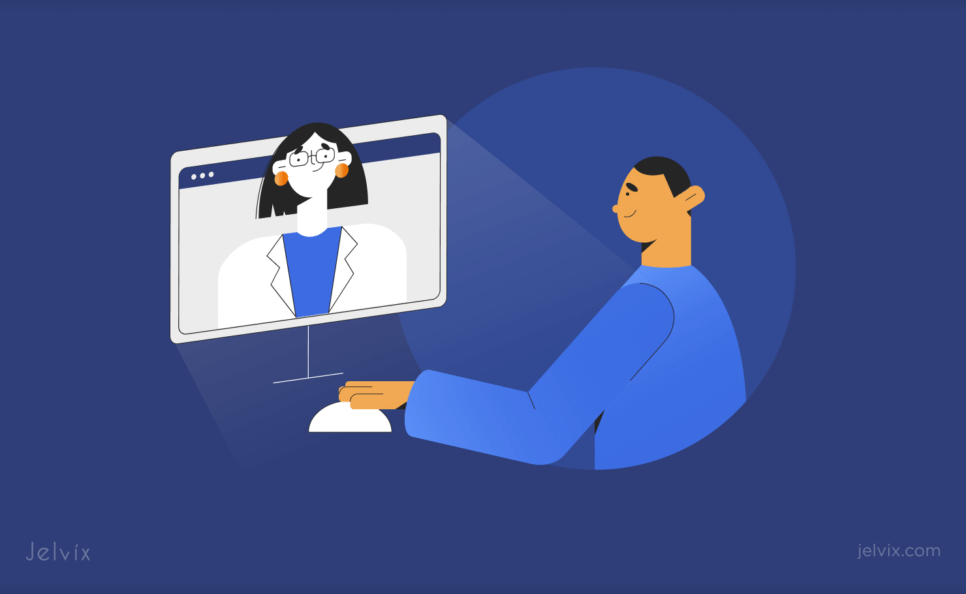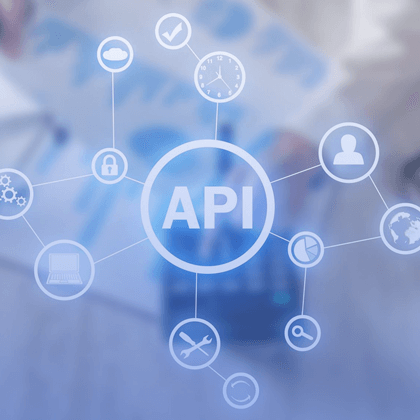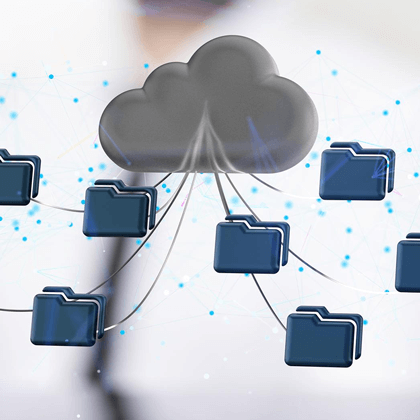Cancer is one of the most distressing diseases in the world, leading to about 9.3 mln deaths annually. Since treating this illness requires closely monitoring patients’ conditions, clinics increasingly use mobile apps that allow for constant and precise tracking of vital signs.
However, developing a custom cancer care app can be costly and difficult to integrate with existing medical systems. What’s more, such apps often impose data security risks and privacy concerns, especially if you don’t have relevant experience in healthcare software development.
If you aim to develop a cancer treatment app that can be easily integrated with your EHR, this article is for you. You’ll discover common types of oncology apps, the key challenges of integrating them, solutions to tackle these issues, and the best practices for painless integration.
Ways How Mobile Apps for Cancer Patients Can Assist in Treatment
Patients who deal with cancer often consider mobile apps as inexpensive tools that help manage their health. For doctors, these apps are sources of valuable patient data that assist in cancer diagnosis and treatment in numerous ways.
Improved Patient Monitoring
An app for cancer patients lets doctors see symptoms and side effects in real time. Patients can log their daily health information, which doctors can review to track progress, spot problems early, and change treatment plans if needed.
Enhanced Communication
Mobile apps provide users with secure messaging, allowing patients to ask questions and receive quick responses from their doctors. Apps also enable patients to request remote consultations via video calls, reducing the need for in-person visits.
Better Pain Management
About 69% of patients who deal with cancer suffer from pain during their daily activities. Oncology apps with instant messaging modules allow to request help when needed which helps reduce pain scores, anxiety, and depression related to cancer.
Efficient Appointment Management
Patients can use mobile apps to manage their schedules and receive appointment reminders. This way, apps reduce the likelihood of missed appointments and ensure patients get timely care.
Access to Medical Records
Mobile apps give doctors quick access to patients’ health records, including treatment history, test results, and medication lists. This helps make informed decisions quickly and accurately.
Personalized Treatment Plans
By analyzing data collected through mobile apps, doctors can create personalized treatment plans for each patient. This ensures patients get care tailored to their specific needs, which can improve overall treatment effectiveness.
Common Types of Applications for Cancer Patients
The medical tech industry offers a variety of apps designed to support cancer patients on their way to treating the disease. These differ in functions and patient needs they address.
Educational Apps
Educational apps help patients with cancer understand their condition better. They offer information about each specific type of cancer, possible treatment options, and what to expect during treatment. They include articles, videos, and interactive tools to empower patients to make informed decisions about their treatment.
Symptom Tracking Apps
These apps allow patients to log their symptoms and side effects and monitor them in real time. They can share this data with doctors, allowing them to check the status of their conditions and make timely interventions.
Discover how real-time data entry transforms healthcare by enhancing efficiency, accuracy, and patient care.
Medication Management Apps
In cancer treatment, it’s important to take medications on time. Medication management apps help patients keep track of their schedules and dosages, improving adherence to the prescribed treatment plans. Such apps include medication reminders and alerts to reduce the risk of missing a drug intake.
Scheduling Apps
Apps of this type help patients set and manage their clinic appointments and receive follow-ups. They can be synced with personal calendars, providing users with reminders for upcoming appointments, which enhances treatment coordination.
Virtual Care Apps
These apps allow patients to have virtual consultations with their doctors, reducing the need for frequent hospital visits. They include video conferencing, messaging, and remote monitoring features to support continuous observation of a patient’s condition.
Cancer Support Apps
Though not directly related to treatment procedures, community apps are as important, connecting patients with support groups, forums, and counseling services. They provide a platform to share experiences, give advice, and seek emotional support.
Diet and Nutrition Apps
Apps for managing nutrition offer dietary guidance tailored to the needs of patients who deal with cancer. They often include meal plans, nutritional information, and tips for managing diet-related side effects.
Key Challenges of Implementing Oncology Apps and Ways To Overcome Them
Although apps for cancer treatment can bring numerous benefits, integrating them into set clinical workflows can be challenging. You need to recognize and address these challenges before they become obstacles to efficient treatment. If apps are implemented poorly, they can turn into hurdles, forcing doctors to troubleshoot tech instead of delivering care to patients.
Integration Complexities
Integrating mobile cancer apps with existing systems like EHRs can be hard and time-consuming. To make this easier, use APIs and middleware to help the app and other systems share data smoothly. Adopt standard data exchange protocols, such as HL7 and FHIR, to ensure all systems can equally comprehend patient data.
Explore how FHIR standards improve healthcare interoperability by facilitating seamless data exchange between systems.
Compliance Challenges
Patient data is highly sensitive and requires adhering to healthcare rules, such as HIPAA in the U.S. or GDPR in the EU. This involves additional investment in technology, expertise, and regular compliance audits. Use strong encryption to protect data, do regular security checks, and provide users with clear privacy policies to communicate safety.
Data Privacy and Security
Keeping patient data safe from breaches and unauthorized access isn’t an easy task, either. Implement multi-factor authentication to ensure only authorized users access the app. Strict access controls should limit data access to necessary staff, while continuous monitoring systems can find and fix security issues quickly.
Usability and Adoption
Patients are different, and some can find it difficult to use mobile apps. Adopting user-centered design principles can help create a simple and accessible interface. You can also provide clear instructions and educational resources to help users understand what to do with your app and why they need it.
Support and Maintenance
Developing and integrating a health app are just parts of the whole job. It also needs ongoing technical support and maintenance which can be costly and requires continuous attention. Set up a support team to help users fix problems quickly. Regularly update your app, improve gaps in its features, and ensure compatibility with new devices.
Cost and Resource Allocation
Developing, integrating, and maintaining a mobile cancer app can be expensive and requires significant resources. To manage costs properly, focus on creating the most important features first. Partner with healthcare organizations, non-profits, and investors to secure funding and resources.
Integrating a Cancer Care App with Your EHR System: Proven Strategies
Integrating a mobile cancer treatment app with your EHR can help your medical staff keep a close eye on patients, enhancing care and engagement. However, the integration process can be tough, especially if you don’t possess the relevant technical experience. The Jelvix team suggests that you follow proven strategies to make the integration smooth and helpful.
Assess Current Systems
Evaluate your EHR system’s compatibility with the new mobile app. Determine which data you need to share between the app and the EHR. This can include patient demographics, treatment plans, medication lists, or symptom logs.
Use Standard Protocols
Adopt standardized data exchange protocols like FHIR to ensure smooth and correct data transfer between the systems. An API in healthcare can help ease the data exchange and bridge gaps between the app and the EHR system.
Ensure Data Security
Implement strong encryption protocols to protect patient data during transfer between the mobile app and the EHR system. Set up strict access controls to ensure that only authorized staff can access the data. Also, regularly update these controls to keep the system secure.
Test Carefully
Ensure the app and EHR system work well together with comprehensive testing, including testing data transfer, user access, and overall system performance. Gather feedback from staff and patients during the testing phase to identify issues and make necessary adjustments.
Provide Training
Very often, staff can be resistant to using new tech. Your job is to teach them how to use the integrated system and access new features. Educate patients, too. Ensure they understand how to log symptoms, schedule appointments, and share their medical records with the doctors.
Monitor and Support
When the integration is done, keep monitoring the system. Use monitoring tools to track data flow, identify issues early, and ensure everything works as intended. Keep the mobile app and the EHR system updated with the latest security patches and features to maintain compatibility and security.
Collaborate with Experts
Work closely with IT professionals to address any technical challenges during the integration process. You can collaborate with an experienced tech partner to implement best practices for integration and troubleshoot ongoing issues.
How AI Helps Improve Cancer Care
AI is making a big difference in cancer care by helping doctors detect cancer earlier, improving diagnosis, and offering new treatment options.
Assisting in Cancer Diagnosing
Large language models, like ChatGPT, can assist patients in understanding their conditions, offering the potential to detect what type of cancer they suffer from. For instance, ChatGPT’s responses to common questions about radiation oncology sometimes outpace the answers provided by human experts. However, AI remains a helping tool rather than a primary cancer-diagnosing solution.
AI for Earlier Cancer Detection
AI systems can analyze loads of medical data, like scans and patient records, to spot signs of cancer that humans might miss. For example, AI can examine mammograms to detect breast cancer more accurately than traditional methods.
Patients can also use a mobile app for skin cancer detection. Such apps are usually dermatologist-approved and available for download on popular marketplaces. They can analyze photos of skin spots and moles to see if they might be cancerous. This helps people keep an eye on their skin health and know when to see a doctor.
The Role of Telemedicine in Managing Patients with Cancer
Telemedicine is becoming an essential part of managing cancer care. It offers many benefits that make it easier for patients and doctors to connect and manage treatment effectively.
Improved Access to Care
Telemedicine allows cancer patients to have virtual appointments with their doctors. Patients can get medical advice, follow-up care, and second opinions without leaving their homes.
Continuous Monitoring
With telemedicine, doctors can monitor patients’ health more closely. Patients can use mobile apps to log their symptoms, side effects, and medication usage. This information is shared with their healthcare team, allowing doctors to track progress and spot any issues early.
Personalized Care
Telemedicine enables doctors to provide personalized care tailored to each patient’s needs. By regularly checking in with patients, doctors can adjust treatment plans based on how the patient responds, ensuring the most effective care.
Support for Rural and Underserved Areas
Telemedicine is particularly valuable for patients in rural or underserved areas who may not have easy access to specialized cancer care. It allows these patients to receive at least basic care from specialists who might be far away.
Reduced Risk of Infection
For cancer patients with weakened immune systems, avoiding unnecessary trips to hospitals or clinics reduces their risk of exposure to infections. Telemedicine provides a safe alternative for receiving care.
Mental Health Support
Telemedicine also offers access to mental health services. Cancer patients can speak with counselors or join support groups through virtual platforms, helping them cope with the emotional challenges of their diagnosis and treatment.
Cost-Effectiveness
Telemedicine can be more cost-effective for both patients and healthcare providers. It reduces travel costs and time off work for patients. It can also lower operational costs for healthcare facilities.
Trends in Oncology-Related Use of Digital Health
Digital health technologies are changing cancer care by improving patient treatment, helping doctors make better decisions, and making it easier for patients and doctors to communicate. However, apps are just a small part of global trends in cancer treatment.
Remote Monitoring and Wearables
Wearable devices and remote monitoring tools let doctors keep an eye on patients’ health in real time. These devices can track things like heart rate, activity levels, and other important health information. This helps doctors detect problems early and take action quickly.
AI and Machine Learning
The AI in cancer diagnostics market is expected to exceed USD 2,084.34 mln by 2032. At the moment, AI and ML are widely used to analyze large amounts of data, find patterns, and support decision-making in cancer care. AI also helps interpret medical images with high accuracy.
Personalized Medicine
Digital health makes personalized medicine possible in cancer care. By analyzing genetic information and other patient data, doctors can tailor treatments to each patient’s needs. This makes treatments more effective and reduces side effects.
Patient Portals
Portals for patients with cancer are secure online platforms where they can access their medical records, test results, and treatment plans. They also allow patients to communicate with their healthcare team, schedule appointments, and request prescription refills.
Virtual and Augmented Reality
VR and AR have the potential to enhance cancer treatment and patient education. VR can help patients manage pain and anxiety by providing calming experiences. AR can help surgeons plan and perform surgeries with better precision by giving them a clear view of tumors and surrounding tissues.
How Jelvix Helps Develop and Integrate Apps for Cancer Patients
As more patients who deal with cancer turn to mobile apps to seek guidance and support, their popularity will only grow. It means clinics need to consider developing cancer care apps to stay competitive and offer medical services to a broader patient base.
At Jelvix, we help medical facilities build custom app solutions that easily integrate into their established clinical settings. Our strategy for developing and integrating medical apps into EHRs centers around patients and their convenience, as well as your unique business goals.
If you need help in creating a custom oncology treatment app or integrating a ready-made solution into your medical environment, contact us. Our experts will provide you with a consultation tailored to your company’s unique needs.
Searching for a professional development team?
Elevate your project's quality with our highly skilled experts and advanced resources.

